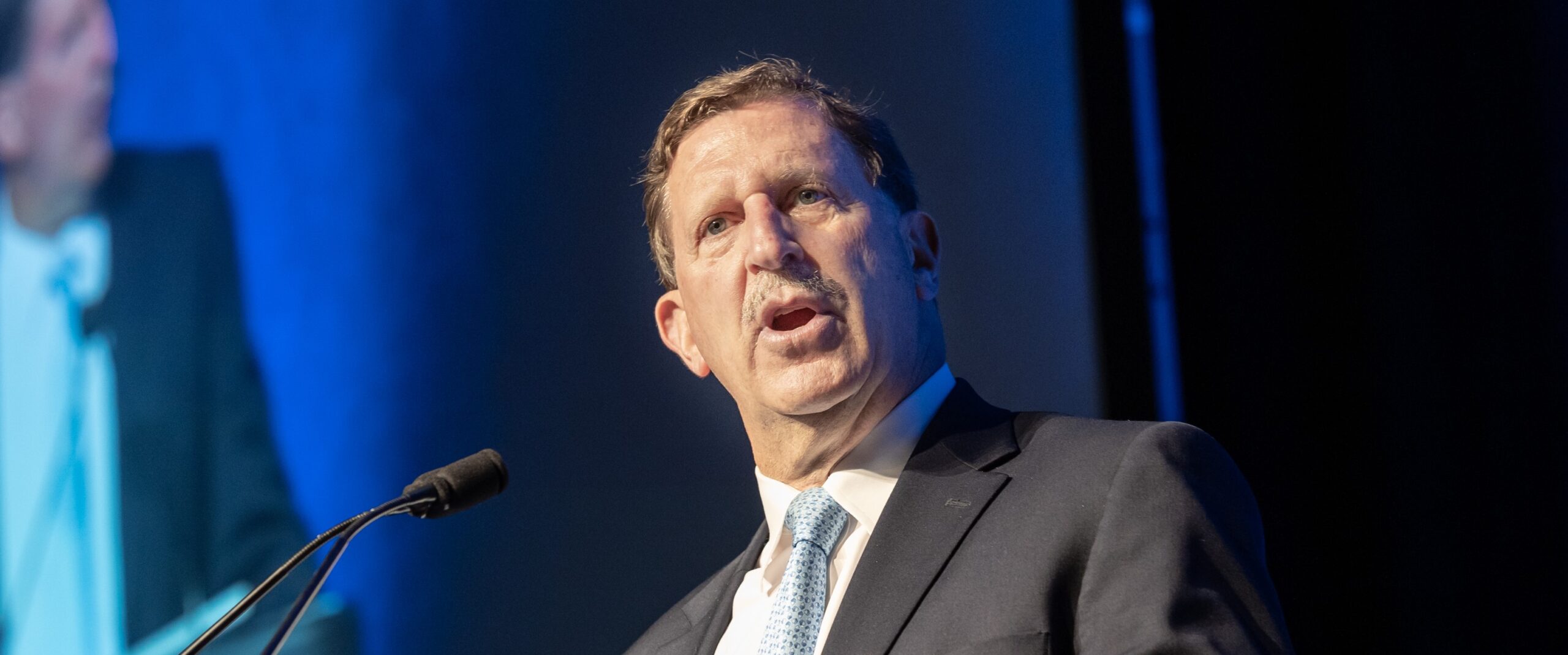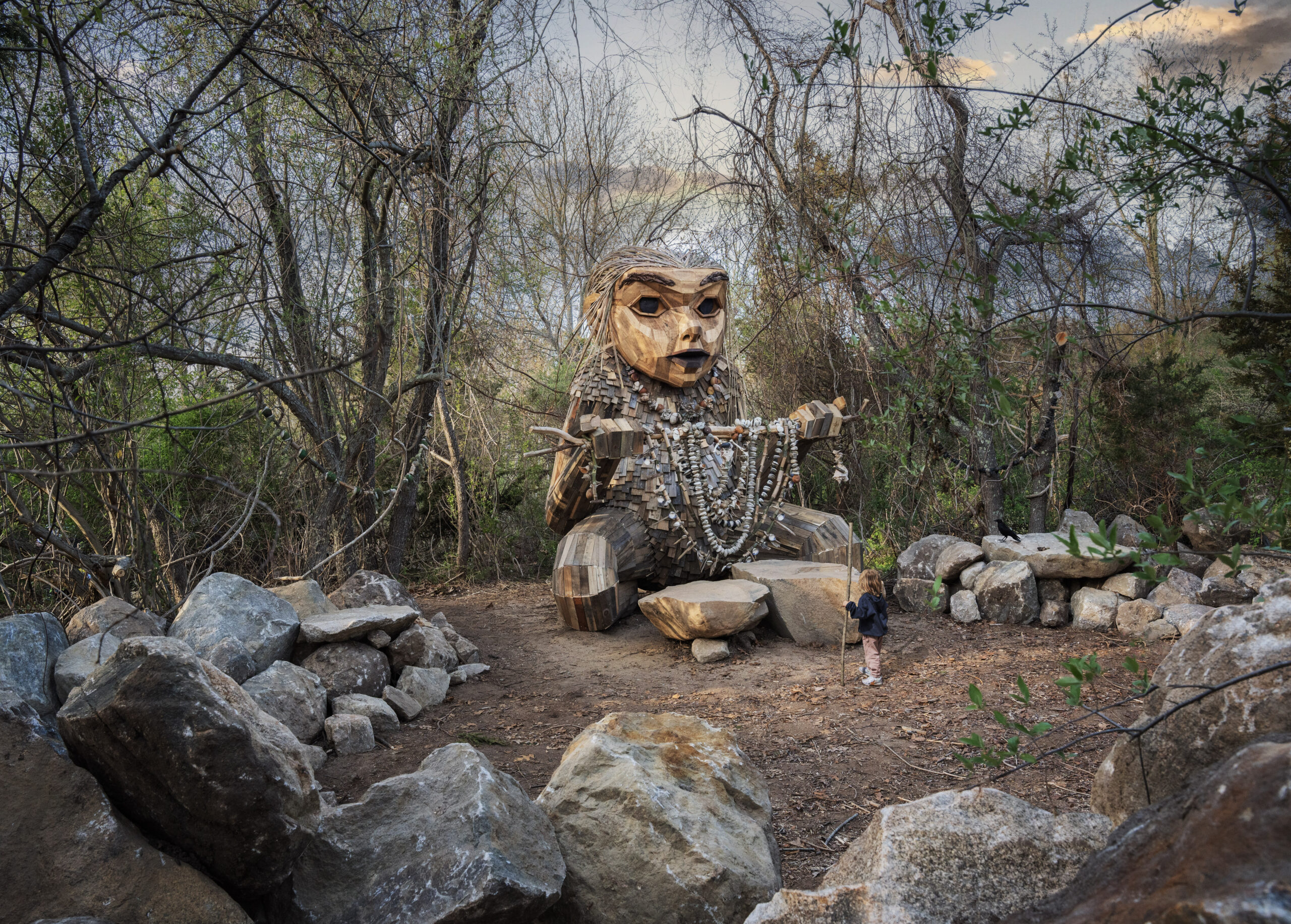‘The challenges in front of us are many times brutally simple to identify and very difficult to solve. We need to break them down, work together, think big and act boldly focused on solutions.’

Good evening. My name is Neil Steinberg. In a few weeks my new title will be, “the guy who used to run the Rhode Island Foundation.” So, thank you all for coming to my last hurrah; over 900 RSVPs is very exciting.
I am going to talk now about some of the highlights of this past year at the Rhode Island Foundation, the challenges I see ahead, and some thoughts on how we go forward to address the issues of the day as we continue to embody our mission to meet the needs of all Rhode Islanders.
But first, let me specifically express my support and admiration for my successor, David Cicilline. Fifty years ago, I ran on a sprint relay team at Brown that won the Ivy League championship. I am now passing the baton to David and will root for him and the Rhode Island Foundation with the same passion and confidence I have always had, excited that he will take the organization and the positive impact on the state to even higher levels!

On June 13, 1916, a group of public-spirited citizens of Rhode Island — realizing the great advantages to the state of a charitable community trust – organized the Rhode Island Foundation with an initial contribution of $10,000 made anonymously by Jesse Metcalf. We are now one of the oldest and largest community foundations in the country.
Well, you saw the 2022 results — with all of you we raised $75 million and awarded $84 million to over 2,400 organizations. Our endowment is $1.3 billion and we have a top quartile investment performance of 8.5% annualized over 25 years. Your community foundation continues to be very solid, growing and here with and for the entire community. To lead, transform and inspire while making the donors’ dreams come true, supporting all sectors of the nonprofit community to reach everyone in the state, and to take on key civic issues of the day.
This past year saw the continued impact of the long tail of COVID and challenging economic conditions. To address this, we distributed $20 million of American Rescue Plan Act funds appropriated to us by the Governor and legislative leaders so that we could help more efficiently and quickly make grants to organizations providing services for housing and homelessness, food insecurity and behavioral health needs. Announced on Oct. 6 of last year, all of the funds were distributed by the end of March to over 240 organizations; grants of $50,000 to $150,000 focused on communities hardest hit by the pandemic.
Recently, we assisted the Executive Office of Health and Human Services to distribute over $3.2 million in grants funded with Opioid Settlement money. Consistently, when asked if we can step up to implement these programs, our answer is always, “yes, we can,” and then we do.
Our long-term education and health planning committees continue to weigh in on critical issues, raise awareness and advocate for improvement. These senior level “tables” are unique opportunities for dialogue, debate and action.
While long-term systemic change is one of our primary goals, we cannot ignore what is going on outside our doors. As the state’s largest and most comprehensive funder of nonprofits, we also support arts and culture, the environment, housing, basic human needs and more.
Regarding housing, we are working with so many on this critical need. In addition to funding many organizations and efforts in this regard, with our partners Blue Cross, LISC, and the Partnership for Rhode Island, we led and helped fund the recent Boston Consulting Group work that produced coordinated data, best practices from around the country, and many options to consider to address homelessness and housing production. This validates and provides support for actions being taken by the Governor and the Speaker, with the primary responsibility now resting with the state Department of Housing. There is much, much more to do!
Regarding economic security, we have championed and provided much input for a new initiative to grow the Life Sciences sector. The industry has spread beyond Boston and Cambridge, and Rhode Island needs to proactively pursue this opportunity that has a foothold here with much more potential. We also funded and led an analysis and recommendations to provide support to grow and sustain BIPOC businesses in Rhode Island; a growth area for the state economy.
We gave out more than $4 million in scholarships to students across the state. For example, the Carter Roger Williams Scholarship is in its seventh year and provides five students with significant need up to $20,000 a year for four years. The new Andrew Scholarship program gave out $500,000 to 100 Rhode Island high school students who will attend colleges and universities in Rhode Island.
Two and a half years ago, our Board committed to our three-year, $8.5 million investment to advance diversity, equity, inclusion and access above and beyond the major funding we have always done to support organizations and leaders working with communities of color. We listened to under-represented groups in the community and partnered with those engaged in this important work. The signature program has been the Equity Leadership Initiative. With two cohorts of 30 completed and with the next one in the selection process, this unique and highly successful program identifies early-to-mid -level leaders in the Black, Latino, Indigenous, Asian and multi-racial communities across all sectors with a significant commitment to personal and professional development and growth. And last year we endowed the program with $2 million. We will soon be announcing awards from some new grant programs in this area as well as information on the total $8.5 million of commitments. And this work continues not as a label, but as a core principle of the Rhode Island Foundation as a leader and voice for the diverse communities that are so important to a vibrant Rhode Island.
Regarding community, last year we brought back one of my favorite initiatives, Together RI. We started this pre-COVID and then had to wait to do it again. Between July and November more than 525 Rhode Islanders gathered at one of 12 venues around the state for a family style meal and conversation to encourage constructive civic and civil dialogue. The topics discussed were Rhode Island’s biggest strengths, biggest opportunities and biggest challenges that impact daily life. For example, strengths included our small size, the diversity within our state, our coastline and our colleges and universities.
As to challenges and opportunities in front of us, there are always many. We often say that together we can do anything, but not everything, so let’s focus along with hard work and determination. Inflation and high interest rates are still having a significant impact on so many, especially those who can least afford it. For many the price for food has seen double digit increases. Gas prices are still high. Rents are out of reach for large parts of the population. We have been through these economic cycles before and we will get through this one albeit with some pain and sacrifice that we all need to make sure is not inequitable and life threatening for anyone.
Behavioral health and substance abuse are at epidemic levels, and we are not adequately addressing them. And overall, persistent inequities and disparities in health care continue.
Housing we have discussed, but it is not going away when we have led the nation in the lowest production of new units the past several years. No one should have to be homeless. No one should be agonizing whether to pay the rent or pay for food or pay for medicine.
With SNAP benefits tightened and Medicaid rolls to be trimmed, the negative impact is growing. We know that food insecurity and inadequate housing are the key social determinates of good health.
And education, education, education. The pandemic’s impacts have been widely discussed related to learning loss and social and emotional challenges. And achievement gaps persist.
So here is my overall concern. If we do not improve our education outcomes, if we do not address housing needs, if we do not tackle the unprecedented mental health and substance abuse challenges, and if we continue to leave populations behind, we are at great risk of not having an adequate workforce in the future.
And speaking of the workforce, we know it is a big issue. For example, there are four professions that are the backbone of communities and always have been — teachers, nurses, police and fire. There are real shortages in all of these for many reasons, including respect for the profession, fair compensation and better working conditions. We need to figure this out or there will be a reduction in our quality of life!
Some ideas for going forward.
Regarding health and health care, we need more rational and cohesive oversight of health care in the state while also addressing the social determinants of health. I am encouraged that the two new hospital CEOs at Lifespan and Care New England — working along with the Deans of the Brown Medical School and School of Public Health — have agreed to collaborate on research, in aggregate, which will benefit the state of Rhode Island. I would also ask, though, that they collaborate on addressing the shortage of primary care and pediatric care doctors and the often-mentioned behavioral health emergency that would benefit the people in the state of Rhode Island.
Regarding K-12 education, in addition to enhanced out-of-school time programs that can supplement the important work in the classroom, our long-term planning committee has advocated to state leaders to address the teacher workforce, the state funding formula, increased professional development for educators, address unfunded mandates and amending the state constitution to ensure the right to an education for all students.
And here is a new idea. Sixty-seven percent of those students who take the RICAS test are below grade level reading proficiency! That means approximately 50,000+ students have some significant reading challenges. That is a big number, especially if that is your future workforce. I would suggest for consideration that we focus and pull out all the stops to get each student in Rhode Island reading at or above grade level in three years. Leveraging tutoring, technology, support from all of our institutions of higher education to encourage, allow, or require college students to help K-12 students in the classroom, to call on the business community to champion and participate with employees regularly volunteering to help in the classroom or after school, engage parents and guardians where possible including with Multi-Language-Learners. We could do this, and not at the expense of every other part of the learning experience. Now, imagine if RI was the only state in the country with 100% of students all reading at grade level and all graduating with this basic proficiency!
And more about housing. It is production, production, production. We need new units; homes and apartments, smaller lots and more density where appropriate, intentional and swift reuse of properties both government and institutional, creative building options to control costs, wrap around services and supportive housing to address homelessness. So, let’s locate, negotiate, accelerate and build units with transparency and accountability. The old Chinese proverb says, ”the best time to plant a tree was 20 years ago. The second best time is now.”
And overall, it is critical that we get more done cost effectively and quicker. To accomplish all that we want and need to do, we must acknowledge that There is a huge difference between a can-do culture and an all too frequent cannot-do culture. Bureaucracy is an impediment not by all, but by too many. We hear: “I need to check, we have never done this before, this is not my responsibility, we don’t have the capacity, there is not enough time, we want to do it, but cannot get an approval, it is too complicated,” and I could go on and on. We need the can-do spirit to grow and work and we want partners not opponents! We desperately need to hear: “we can do it, we can get it, and yes, that is possible.”
Here is one positive example. When the Governor approved the Cranston Street Armory as a warming center back in the winter, I joined Eileen Hayes from Amos House at the Armory as she was trying to get it up and running. I saw the National Guard and State Properties folks along with Amos House and Crossroads representatives demonstrate the can-do spirit. Need refrigerators? We can get them. Need bathrooms? We can get them. Need to secure certain entrances? We can do that. It was great! And when under pressure to get the facility open, Amos House needed immediate funds that the state could not provide for two weeks, the Rhode Island Foundation provided $50,000 for the first two weeks of operation.
Leaders need to lead, leaders of leaders need to prioritize a can-do culture for success.
And all of these goals, ideas, discussion need to be equitable and inclusive. Demographics here and across the country are changing. We should embrace a broad perspective on diversity to include race, ethnicity, sexual orientation, religion, country of origin, disabilities, age, veterans and more. I am often reminded of the signature song of the great Aretha Franklin….R-E-S-P-E-C-T. Let’s respect each other, value and leverage our differences, and treat each other the way we want to be treated.
Then we can do and then we can make progress. The challenges in front of us are many times brutally simple to identify and very difficult to solve. We need to break them down, work together, think big and act boldly focused on solutions. The social and economic will needs to overcome the political will. We can be empathetic and understanding while maintaining high expectations. And then You will be surprised and impressed what we can ALL do to make it happen.
What is our state’s Motto? HOPE.
The Rhode Island Foundation, with and for the people of Rhode Island, will continue to keep hope alive.
Steinberg closed the meeting with these words:
When we were planning this event, I asked if I could have the last few minutes to express my thanks. I have been lucky in my career, Working for three iconic Rhode Island institutions: Fleet Bank, Brown University, and the Rhode Island Foundation. There were many ups and downs over the years, but I figured out that luck is the intersection of hard work and opportunity. I have also learned the important lessons of empathy, humility, and gratitude from all of you and many others
Now let me first thank Genie, my wonderful wife of 41 years. Many of you know I can be impatient, not listen, and be very quick to judgement. Well luckily she is the nice one in our partnership and it has been due her unwavering and amazing support as my guiding light that I have been able to serve the community for many years. Thank you Genie.
And I am thrilled that my two sons, Jason and Eric, have joined me this evening. You have both taught me more about life than I have taught you! When we see each I always get a hug from each of you. Many times I have been asked for my definition of success….getting hugs from my two adult sons when we see each other –That is MY definition of success!
I have spent a great deal of time with My Rhode Island Foundation family who inspire me each day with the passion, commitment, and high performance that enable us to do all the work we do for so many. Annually named one of the Best Places to work… thank you to all my colleagues. Our leadership team…Angie Ankoma, Bridget Baratta, Sharon Collyer, Arianne Corrente, Kathleen Malin, Jenny Pereira, and Jen Reid ….worked hand in hand with me to lead the Foundation and I thank them all.
And special thanks to my executive assistant Wendi DeClercq who has kept me going and going and going…mostly in the right direction!
Thank you to the boards of the Rhode Island Foundation past and present who have provided me with guidance and support. Their focus and vision were key to my being able to balance long term strategy with short term needs and deploy our people and dollar resources to positively impact the community. I especially want to thank the board Chairs that have been my partners. David Hirsch, Fred Butler, Marie Langlois, Polly Wall and now Al Kurose. We worked side by side to fulfill the Foundation’s mission. And Al had the added responsibility of overseeing the search for my successor which he did with professionalism and grace. Thanks Al!
Our donors are so very special. Their philanthropy over 107 has inspired additional philanthropy to benefit the state of Rhode Island.
During my career I have cultivated and closed many gifts including the $100 million naming for the Warren Alpert Medical School at Brown. However, during the spring of 2020. Governor Raimondo called at the outset of Covid us to raise funds to support growing needs due to the Pandemic. We raised $20 million in nine months. Well, one day I got a call as I was sitting secluded in my office from a woman who lived in a local nursing home. She called to tell me that she wanted to make a contribution to our Covid Response Fund and that $1 was all she could afford and asked how could she get it to us. I sincerely thanked her for her generosity, and we had someone go see her to pick up the $1 to help others. That is truly my favorite donor story.
The nonprofit organizations across the state that we support are the heroes every day doing the boots on the ground work in all sectors. I always found talking with them, visiting them, and seeing first -hand their hard work in the community gave me purpose and energy. It is our privilege to provide funding and guidance and training for so many organizations that make life in Rhode Island better for so many. Thank you all for the great work and for inspiring me!
Given our civic leadership initiatives, I have had the opportunity to work with business leaders as well as with our congressional delegation and most of our state and local elected officials and leaders. While I might not always agree on every policy or decision, I always respected whoever is in office, their commitment to public service, and admire their willingness to put themselves out there to serve the community. It has been an honor to work with all of you.
Thank you.
As I wrap up, I am reminded of the advice that I have given at the end of each annual meeting asking everyone to look forward, be positive, and take rhetoric to action. My goal now is to take my own advice….look forward and not live in the past, be positive not become a grumpy old man, and to take rhetoric to action as I wear the t-shirt that hangs in my office that says “Just Do it”!
I feel bittersweet but ready for the next chapter. And I am confident that David will lead the Foundation, with all of you, to create a new legacy while fulfilling our mission.
Writer EB White said: “I am still encouraged to go on. I wouldn’t know anywhere else to go” That resonates with me.
And as one of my favorite old time comedians Bob Hope would say…”thanks for the memories”!
See you around!
And drinks are on me…
The Rhode Island Foundation is among the organizations that support Ocean State Stories.





